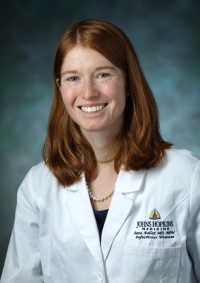Focusing on Patients to Reduce Healthcare-Associated Infections During Transitions to Home Care
Sara Keller, M.D., M.P.H.
Johns Hopkins University School of Medicine

M.D., M.P.H.
“AHRQ really took a chance on me, allowing me to look into an under-researched area.”
For Sara Keller, M.D., M.P.H., an associate professor in the Division of Infectious Diseases, Department of Medicine, at Johns Hopkins University School of Medicine, American healthcare presents a contradiction. “I find it extremely frustrating that we have some of the greatest minds in the world developing the best treatments, and patients still experience harm,” she said.
This contradiction led Dr. Keller to seek ways to prevent, reduce, and eliminate healthcare-associated infections (HAIs). With the assistance of AHRQ funding, she has joined the league of prominent U.S. researchers engaged in HAI research, with a focus on preventing infections when patients are discharged from the hospital to home healthcare.
“AHRQ really took a chance on me, allowing me to look into an under-researched area, specifically how patients self-administer intravenous antibiotics in the home and the complications of IV antibiotic administration at home,” she said.
Dr. Keller’s history with AHRQ began in 2016, when she was mentored by a pair of Johns Hopkins colleagues, AHRQ grantees Sara Cosgrove, M.D., M.S., and Pranita Tamma, M.D., M.H.S., to work on the AHRQ Safety Program for Improving Antibiotic Use, a project implementing the Comprehensive Unit-based Safety Program (CUSP). This led to an AHRQ Mentored Clinical Scientist Research Career Development Award in 2018, which kick-started her career as an HAI researcher. This award also helped her develop protocols for Outpatient Parenteral (intravenous) Antibiotic Therapy—giving guidance to patients about how to safely administer their antibiotics intravenously at home.
“These patients have gone through so much in the hospital—they’ve had surgery, they’ve been critically ill, and they’re getting around-the-clock care from highly trained nurses and physicians,” Dr. Keller said. “Then they get home to do the same type of routine care—things like wound care, or central line or urinary catheter care. They do get training for this, but it’s typically very brief, and they’re overwhelmed by so much information. Plus, there are so many other factors at home. It’s amazing that patients do as well as they do.”
In 2019, Dr. Keller received an AHRQ grant to identify barriers to antimicrobial stewardship in the hospital-to-home transition. As a result of this study, she identified the following five barriers that may cause harm: clinician perceptions that patients expect to receive an antibiotic prescription; clinician diagnostic uncertainty; differences in prescribing between an attending physician-led team versus a multidisciplinary team culture; not accounting for all antibiotics prescribed during the patient’s entire course of illness; and discharging a patient before all clinical data are received. Identifying these barriers and then implementing targeted interventions may lead to more effective outcomes for antibiotic use during the hospital-to-home transition.
Continuing her focus on HAIs, Dr. Keller received another AHRQ grant in 2020 to develop a home infusion collaborative, consisting of five home infusion agencies, to eliminate central line-associated bloodstream infections. The project aims to bring standardized definitions, quality reporting standards, and catheter-associated bloodstream infection prevention strategies to home infusion patients who receive chemotherapy, nutrition, antibiotic treatment, or other treatments at home, often with the help of home health and family caregivers. Today, an estimated 1.2 million patients in the United States receive home infusion therapy, often with minimal training by home caregivers. This project is scheduled to end in 2025.
Dr. Keller is also an investigator on another AHRQ project, which aims to evaluate home healthcare responsiveness to safety threats in older adults’ care transitions during the COVID-19 pandemic. This project is scheduled to end in 2023.
As a principal investigator, Dr. Keller now can do for younger researchers what others did for her—mentor and guide a new generation to ensure that fresh ideas are constantly emerging. “AHRQ funding, with its encouragement to pursue investigator-initiated research, paved the way for my entry into this community of HAI researchers,” she said. “This allows us to be really creative and look for new ways to prevent HAIs.”
Dr. Keller is a member of the Society for Healthcare Epidemiology of America (SHEA) and the Infectious Diseases Society of America. She also chairs SHEA’s Research Network.
Related AHRQ Resources
Principal Investigator: Sara Keller, M.D., M.P.H.
Institution: Johns Hopkins University School of Medicine
Grantee Since: 2018
Type of Grant: Various
Consistent with its mission, AHRQ provides a broad range of extramural research grants and contracts, research training, conference grants, and intramural research activities. AHRQ is committed to fostering the next generation of health services researchers who can focus on some of the most important challenges facing our Nation's health care system.
To learn more about AHRQ's Research Education and Training Programs, please visit https://www.ahrq.gov/training.



